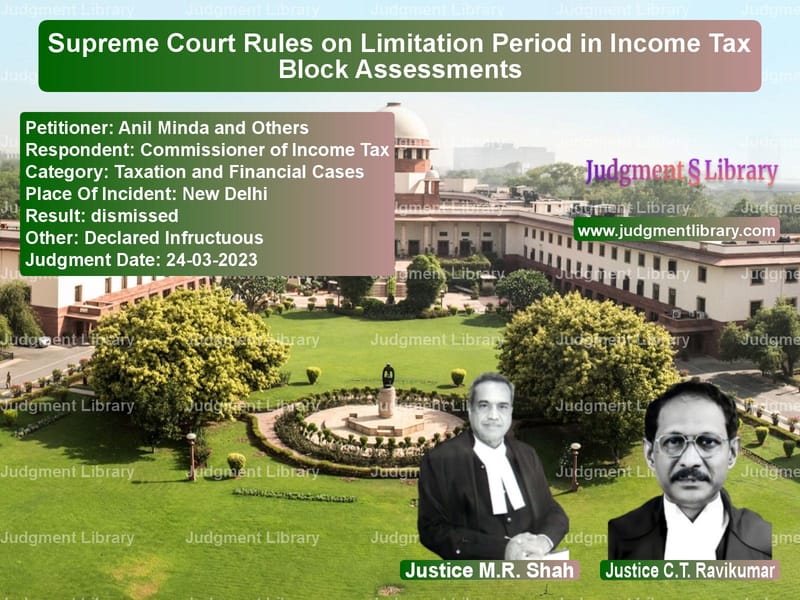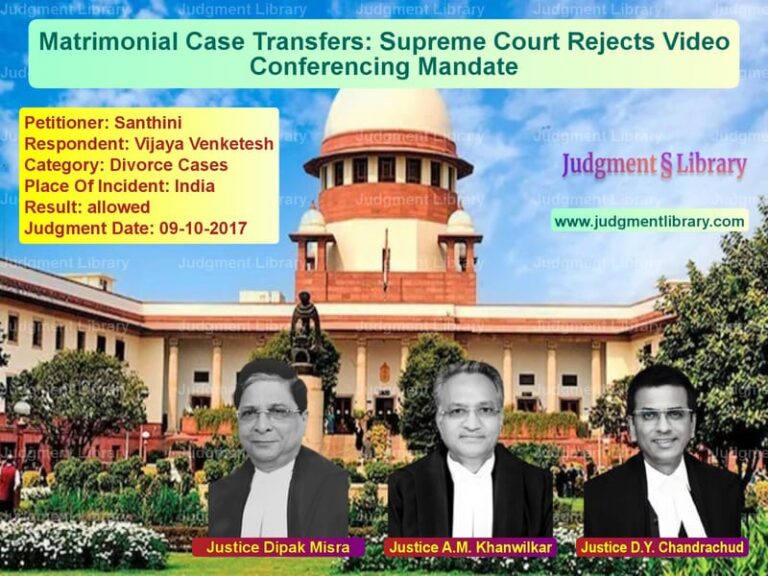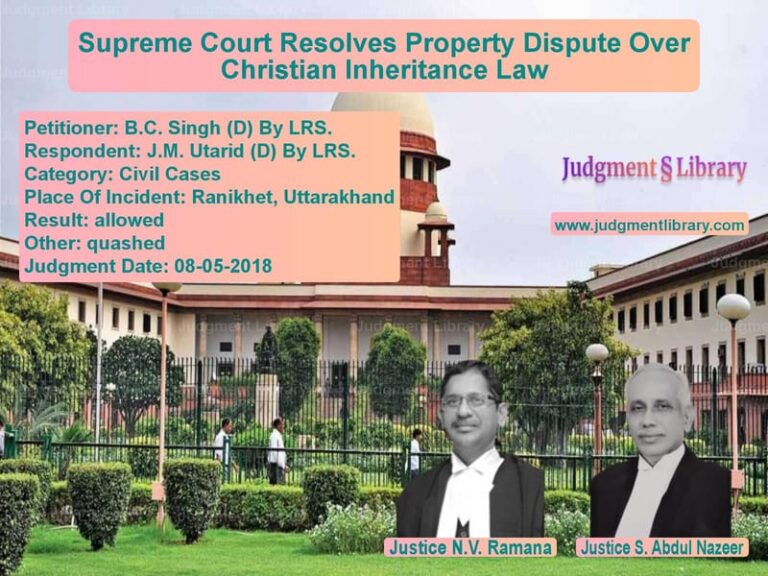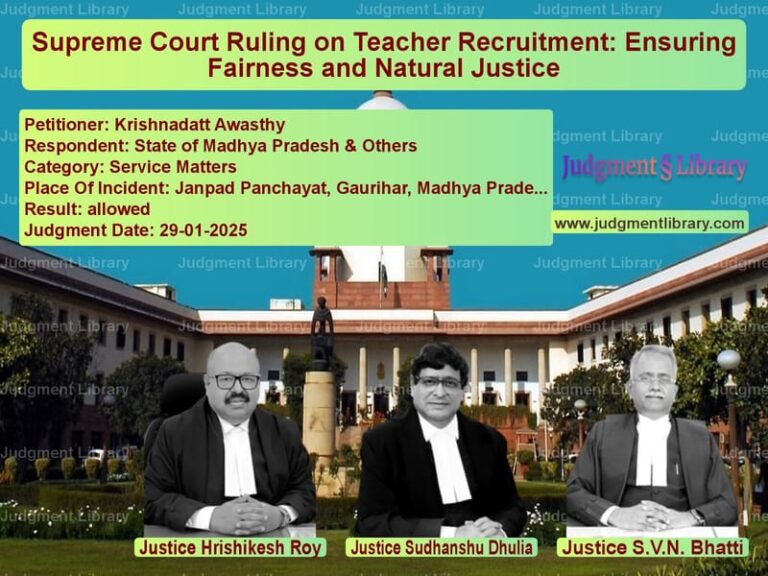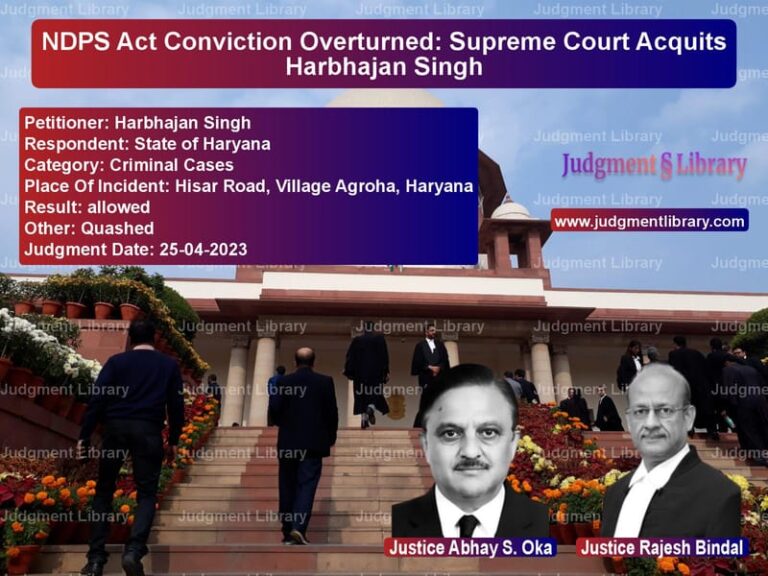Supreme Court Rules on Limitation Period in Income Tax Block Assessments
The case of Anil Minda and Others vs. Commissioner of Income Tax concerns the issue of whether the limitation period for block assessment under Section 158BE of the Income Tax Act, 1961, should commence from the date of the last Panchnama or the date of the last search authorization. The Supreme Court upheld the Delhi High Court’s ruling that the limitation period must be calculated from the date of the last Panchnama, ensuring clarity in tax assessments.
Background of the Case
The dispute originated from a series of search operations conducted under Section 132 of the Income Tax Act, 1961. The issue was whether the two-year limitation period for completing the block assessment should be counted from the date of the last authorization or from the date when the last Panchnama was drawn.
Key events leading to the dispute:
- March 13, 2001: First search authorization was issued.
- March 26, 2001: Second search authorization was issued.
- April 11, 2001: Last Panchnama was drawn for the first search authorization.
- April 2003: Assessment order was passed.
- 2010: The Delhi High Court ruled in favor of the Revenue, holding that limitation should be counted from the date of the last Panchnama.
- March 24, 2023: The Supreme Court upheld the High Court’s ruling.
Arguments by the Appellant (Assessees)
The assessees contended that:
- The limitation period should start from the date of the last authorization, which was March 26, 2001.
- The assessment order passed in April 2003 was therefore time-barred.
- As per Explanation 2 to Section 158BE, the last authorization should be the starting point of limitation.
- Reliance was placed on the Karnataka High Court’s ruling in C. Ramaiah Reddy vs. Assistant Commissioner of Income Tax.
Arguments by the Respondent (Income Tax Department)
The Revenue defended the High Court’s ruling, arguing that:
- The limitation period should be counted from the date of the last Panchnama, which was drawn on April 11, 2001.
- As per Explanation 2 to Section 158BE, the Panchnama concludes the search, and thus, it should be the reference date.
- Material collected after the last authorization must be considered in the assessment, making the Panchnama date crucial.
- Reliance was placed on the Supreme Court’s ruling in VLS Finance Ltd. vs. Commissioner of Income Tax.
Supreme Court’s Judgment
The Supreme Court ruled in favor of the Income Tax Department, holding that the limitation period for block assessment starts from the date of the last Panchnama.
1. Date of the Last Panchnama Determines the Limitation Period
The Court clarified that the date of the last Panchnama is the relevant date for determining the limitation period:
“As observed and held by this Court in the case of VLS Finance Limited, the relevant date would be the date on which the Panchnama is drawn and not the date on which the authorization is issued.”
2. Explanation 2 to Section 158BE is Binding
The Court held that Explanation 2 to Section 158BE must be interpreted literally:
“The authorisation referred to in sub-section (1) shall be deemed to have been executed on the conclusion of search as recorded in the last Panchnama.”
3. Object and Purpose of Explanation 2
The Court emphasized that accepting the assessee’s interpretation would render Explanation 2 meaningless:
“If the submission on behalf of the assessees is accepted, in that case, the entire object and purpose of Explanation 2 to Section 158BE would be frustrated.”
4. Relevance of Material Collected During Searches
The Court pointed out that assessment is based on all material collected during searches, making the last Panchnama the logical reference date:
“The block assessment proceedings are initiated on the basis of the entire material collected during the searches and on the basis of the respective Panchnama drawn.”
Final Ruling
The Supreme Court:
- Dismissed the appeals filed by the assessees.
- Upheld the Delhi High Court’s ruling.
- Held that the limitation period for block assessment starts from the date of the last Panchnama, not the date of the last authorization.
Implications of the Judgment
This ruling has significant implications for tax administration:
1. Provides Clarity on Limitation Period
- Ensures uniformity in calculating the limitation period for block assessments.
- Prevents disputes over whether the authorization date or the Panchnama date is relevant.
2. Ensures Effective Tax Investigations
- Allows tax authorities to complete assessments based on all material collected during searches.
- Prevents assessees from exploiting technical loopholes to escape tax liabilities.
3. Aligns with Supreme Court Precedents
- Reaffirms earlier rulings in VLS Finance Ltd. and similar cases.
- Strengthens the principle that the search conclusion date is key for tax assessments.
Conclusion
This judgment reinforces the importance of the last Panchnama in determining the limitation period for block assessments under Section 158BE of the Income Tax Act. The ruling provides much-needed clarity to taxpayers and tax authorities, ensuring fair and effective tax administration.
Petitioner Name: Anil Minda and Others.Respondent Name: Commissioner of Income Tax.Judgment By: Justice M.R. Shah, Justice C.T. Ravikumar.Place Of Incident: New Delhi.Judgment Date: 24-03-2023.
Don’t miss out on the full details! Download the complete judgment in PDF format below and gain valuable insights instantly!
Download Judgment: anil-minda-and-other-vs-commissioner-of-inco-supreme-court-of-india-judgment-dated-24-03-2023.pdf
Directly Download Judgment: Directly download this Judgment
See all petitions in Income Tax Disputes
See all petitions in Tax Evasion Cases
See all petitions in Tax Refund Disputes
See all petitions in Banking Regulations
See all petitions in GST Law
See all petitions in Judgment by Mukeshkumar Rasikbhai Shah
See all petitions in Judgment by C.T. Ravikumar
See all petitions in dismissed
See all petitions in Declared Infructuous
See all petitions in supreme court of India judgments March 2023
See all petitions in 2023 judgments
See all posts in Taxation and Financial Cases Category
See all allowed petitions in Taxation and Financial Cases Category
See all Dismissed petitions in Taxation and Financial Cases Category
See all partially allowed petitions in Taxation and Financial Cases Category

